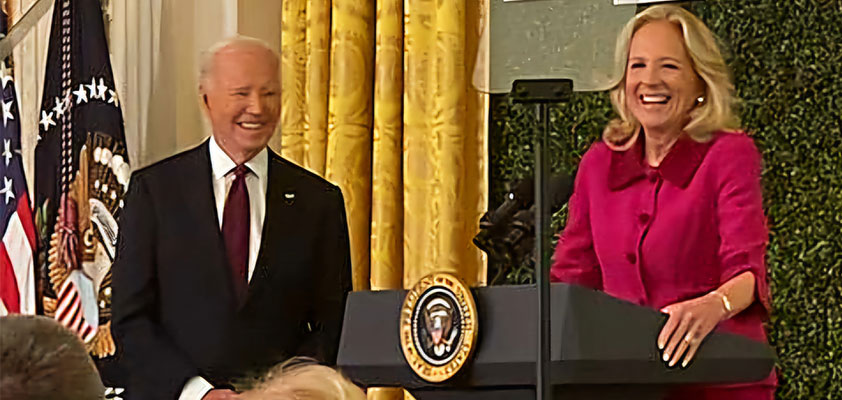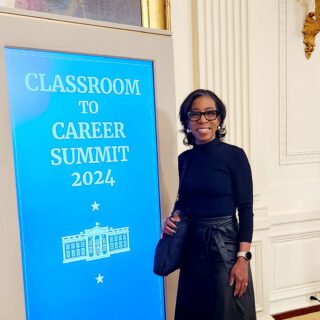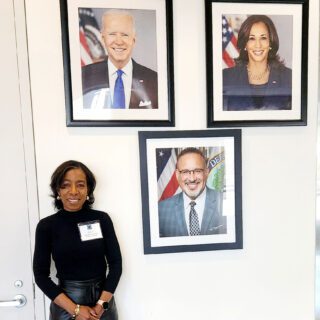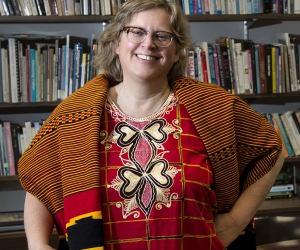
Dean Zamani-Gallaher Participates in White House Education Summit
President Joe Biden, First Lady Jill Biden, and U.S. Cabinet officials lead Classroom to Careers Summit.
Eboni M. Zamani-Gallaher’s longstanding commitment to improving college access and student outcomes came full circle with her recent visit to the White House.
The University of Pittsburgh School of Education’s Renée and Richard Goldman Dean joined about 200 education and workforce leaders for the Biden-Harris Administration’s first-ever Classroom to Career Summit on November 13, 2024.
President Joe Biden and First Lady Jill Biden kicked off the daylong summit with remarks, followed by a panel discussion by members of the U.S. Cabinet about the necessity of aligning competencies, training, and meeting workforce needs through credentials of value. The conversation included Commerce Secretary Gina Raimondo, Secretary of Education Miguel Cardona, Acting Secretary of Labor Julie A. Su, and Transportation Secretary Pete Buttigieg.
In the afternoon, Zamani-Gallaher traveled to the U.S. Department of Education Lyndon Baines Johnson Building for an afternoon of sessions on similar topics.
“At the invitation of Chancellor Gabel and Provost McCarthy, I was honored to represent the School of Education and the University of Pittsburgh at the Classroom to Career Summit,” said Zamani-Gallaher. “It was energizing to collaborate with others who share my passion for expanding pathways into higher education to ensure that all students can earn credentials of value that lead to a secure financial future.”
Attendees at the White House Summit included U.S. cabinet members and other senior administration officials; state and local elected officials; community college presidents; K-12 leaders; unions; workforce development leaders from the nine White House Workforce Hubs and other communities across the country; business leaders; representatives of philanthropic organizations; and students.
Expanding Pathways at Pitt
 The second half of the White House summit was led by Department of Education officials involved in the Raise the Bar: College Excellence and Equity initiative.
The second half of the White House summit was led by Department of Education officials involved in the Raise the Bar: College Excellence and Equity initiative.
The goals align with Zamani-Gallaher’s vision for Pitt Education.
In her first year as dean, Zamani-Gallaher established priorities for opening new pathways into Pitt Education.
The school is creating transfer-friendly pathways for community college graduates to earn a bachelor’s degree—including a new $5,000 scholarship for select incoming and returning students.
Additionally, the school is developing more online degrees and certificates and creating new microcredentials, stackable programs, and noncredit credentials of value in fast-growing fields.
“Part of Pitt Education broadening participation and having broader impact is through incremental credentialing pathways—hence stackable microcredentials that offer students applicable, in demand, and transferable competencies that are industry recognized are imperative,” said Zamani-Gallaher.
Drawing on A National Perspective
 Zamani-Gallaher wants every student to have access to a high-quality college education—especially those from disadvantaged backgrounds.
Zamani-Gallaher wants every student to have access to a high-quality college education—especially those from disadvantaged backgrounds.
“There are many people who fall in the category of ‘some college, no degree,’ and they often feel discouraged about continuing their education due to challenging circumstances that arise in their lives. We need to change that. We must do more to support the ‘to-and-through’ of students. That means offering more on-ramps to college and the wraparound support services while they’re here to help students complete the credentials needed to thrive in today’s workforce.”
Pitt Education’s PreK-12 teacher training programs, particularly bolstering pipelines for early childhood professionals, are examples of industry-aligned programs that can address labor shortages.
Zamani-Gallaher has a national perspective since she also currently serves as executive director of the Council for the Study of Community Colleges and President of the Association of the Study for Higher Education.
To date, she has secured $11 million in contracts and research grants on externally funded projects aimed at equitable postsecondary pathways, workforce development and community college leadership.




